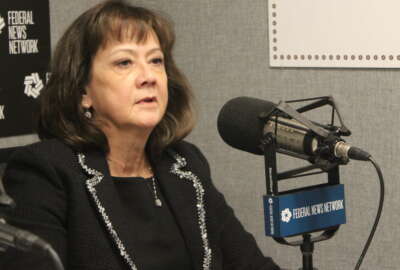
Homeland Security aims to stop coronavirus related counterfeiting
You might not think of DHS Investigations as a center for intellectual property protection but that's what its National IP Rights Coordination Center does.
Best listening experience is on Chrome, Firefox or Safari. Subscribe to Federal Drive’s daily audio interviews on Apple Podcasts or PodcastOne.
When the pandemic hit, waves of fraudulent and counterfeit goods rolled in about four milliseconds later. You might not think of Homeland Security Investigations as a center for intellectual property protection. But that’s exactly what its National IP Rights Coordination Center does. The Center has gotten together with several large drug suppliers and distributors to deal with counterfeit pharmaceuticals. Joining the Federal Drive with Tom Temin with details, the Center’s director, Steve Francis joined Federal Drive with Tom Temin to discuss. Read more information here.
Interview transcript:
Tom Temin: Mr. Francis, good to have you on.
Steve Francis: Good morning. Thanks for having me.
Tom Temin: Let’s start with the beginning here. The center basically tries to intercept incoming counterfeit goods of all sorts that might cross the nation’s borders. Tell us more.
Steve Francis: Yeah, the National IPR center was created over a decade ago and it stands at the US government’s response to combating IP crimes and the enforcement of the international trade laws. There are 25 different partners that sit at the National IPR Center including Deputy Director positions by US Customs and Border Protection, CBP, as well as the FBI.
Tom Temin: Got it. So you’re the group that when there’s a whole bunch of phony Yves Saint Laurent purses or something, you grind them up and crush them publicly to let people know what’s going on?
Steve Francis: Well, I’d like to think we do some other things that are really important to the health and safety of US consumers. And in addition to the luxury goods that we detain, and seize and investigate, the counterfeits kind of flooding the markets, it has a significant impact on, you know, the national security of the United States as it relates to counterfeit micro electronics that are going into DoD supply chains or the economic security impact that has with hundreds of billions of dollars of IP crimes that are committed. And lastly, you know, the health and safety of US consumers, whereas as it relates to counterfeit, fraudulent, substandard goods that are flooding the market specifically now during the COVID-19 pandemic.
Tom Temin: Yes and now you have a partnership with several very well known blue chip companies, American companies that are in this whole pharmaceutical supply chain and manufacturing. Tell us about who’s in it and tell us more about the partnership.
Steve Francis: Sure, this is a really exciting partnership we announced earlier this month to assure security of the supply chain both from the manufacturing distribution and the protection of US consumers and the partnerships with Amazon, Alibaba, Chinese marketplace, as well as Pfizer, Merck, 3M and Citibank. So ensuring kind of a holistic approach and really a unique one of a kind announcement for us at the center and ensuring that we’re commenting the entire ecosystem as it relates to the counterfeit substandard goods that are flooding the markets. And if they do arrive, we have the reassurances from these companies including specifically the marketplaces and securing that supply chain by taking down these bad actors, as well as the manufacturing companies that are providing us information from Pfizer, Merck, 3M on the counterfeit goods that really are hurting us consumers and lastly, with Citibank, the financial institution that’s helping us identify individuals that are being financially different during this global pandemic,
Tom Temin: Alright, suppose I’m 3M and 3M makes high end, high quality masks, facial masks, how do I as 3M, and how does the government know that there’s a batch coming that is counterfeit? How does that get discovered and then what happens when it is discovered?
Steve Francis: The National IPR Center is essentially a taskforce with all these agencies, and working closely with the private sector. When a bad shipment comes from overseas and it’s detained. A determination has to be made, whether those items are fraudulent or counterfeit. And the private sector is really the only company such as 3M that can identify and assist us with determining whether they are counterfeit or fraudulent goods that are entering the market. So during this pandemic, we’re working very closely with these companies that have global manufacturing plants to assist us with determining those goods, whether or not they’re counterfeit or fraudulent. So that partnership is you know, we’re very tight at the hip in that sense to to assist us with those determinations and to protect the consumers.
Tom Temin: Do the manufacturers have access to samples of what’s coming in, say from the latest ship that comes into, I don’t know, wherever they come into to Fort Lauderdale or to Los Angeles?
Steve Francis: So they do. We work very closely with the manufacturers. So, you know, the brand owners brand protection partnership that we’ve had for over a decade now with many of these companies, but specifically is as it relates to COVID-19, we’re dealing with the manufacturers on a day to day basis to share information, to help us identify whether these goods coming around the world are counterfeit or substandard and harmful to US consumers.
Tom Temin: And when you have the distribution media like Alibaba or Amazon, how do they figure into the whole process?
Steve Francis: Both Amazon and Alibaba have given us their commitment and we’ve been working very closely with them, they are really important to ensure the security of the supply chain. So my understanding is that both companies have taken very strong initiatives to ensure that that supply chain has secure manufacturers that are providing legitimate goods as it relates to COVID-19 products. And we work very closely with identifying bad actors that have been identified on their marketplaces. And they’re taking a proactive approach to removing those individuals or organizations from their marketplaces and protecting the health and safety of the US consumers.
Tom Temin: Because there are legitimate products that are made in China that people are buying. So do Chinese manufacturers also face the same problem of their stuff being counterfeited by other Chinese companies, or I guess any other company?
Steve Francis: Sure, I assume that that’s probable as well that many of these products are being counterfeited but working with these marketplaces, it’s essential to the US consumers that we were really focused on here in the United States.
Tom Temin: Got it. And so what actions can happen then, suppose there was a shipment of masks or pills and they’re discovered to be no good, are they destroyed or do you go after the manufacturer? Is it possible to trace the sources?
Steve Francis: Absolutely, just within a two months time when this global pandemic hit, and we have these individuals organizations that are exploiting vulnerable populations, Homeland Security Investigations launched operation stolen promise. And with that, the agency brought together not only our intellectual property rights coordination center, we also brought in our cyber crime center, our financial crimes division, as well as our international operations. In a little over a month’s time, we’ve initiated over 500 criminal investigations, we’ve seized over $3.5 million in illicit proceeds, we’ve conducted over 30 search warrants and had 14 criminal arrests relating to COVID-19 illicit activity.
Tom Temin: I imagine the supply chain of the illicit materials can get pretty complicated, because it might have a US importer and distributor but it might be manufactured overseas, and so on. So there’s probably a complicated chain did you have to follow it to get to really who’s behind all of this?
Steve Francis: Yeah, and I think that’s why it’s really important that this announcement, you know, ICE, Homeland Security Investigations partners with Amazon, Alibaba, Pfizer, Merck, 3M and Citibank, and ensuring that we’re securing that supply chain from manufacturing all the way to distribution here in the United States.
Tom Temin: And just give us a sense of how bad the problem is that is pandemic related right now.
Steve Francis: So we’re seeing a significant increase in items that, you know, are coming across from overseas. You know, historically we’ve looked at China and Hong Kong with about 85% of our counterfeits were coming from those two areas over the last three years and now we’re looking at over 30 different countries that are exporting items into the United States. And primarily we’re focused on you know, medical devices, ppe, the personal protective equipment, the preventative antiviral products and also pharmaceutical. So each day those detentions and seizures are Increasing. But, you know, one area that I really would like to highlight is the effort by US Customs and Border Protection, our frontline officers that are doing this work each and every day and really protecting the health and safety of of US consumers. And without them, they’re doing an incredible job and helping all of us, including the consumers as well as the government is protecting that supply chain.
Tom Temin: And is there anything that a average consumer can do to determine whether something is legit or not?
Steve Francis: Sure, I would just advise our listeners that they need to be aware of websites or individual selling products that are claiming to prevent, treat, diagnose or cure COVID-19. Be aware of individuals requesting personal or banking information in exchange for COVID-19 products. When you’re purchasing these items, and they’re being shipped to your home, be careful of items that are written in a foreign language or where they have misspellings. And lastly, as it relates to pharmaceuticals, which are a significant concern to us, is don’t buy those prescription pharmaceutical from third party marketplaces or social media platforms, and please consult with your physicians.
Tom Temin: And if it says 3F or 5M, it’s probably counterfeit.
Steve Francis: Probably. Some of the misspellings that we’re concerned about. So our job here at the National IPR center, and really the entire government, is to have safe products that are being used by not only your average consumers, but also the medical community — and we’re hoping that we’re doing our best to ensure that those products are safe and able to be used.
Tom Temin: Steve Francis is the Assistant Director for the Global Trade Investigations Division and Director of the National Intellectual Property Rights Coordination Center, part of Homeland Security Investigations. Thanks so much for joining me.
Steve Francis: Alright, sir. Thank you for your time.
Copyright © 2024 Federal News Network. All rights reserved. This website is not intended for users located within the European Economic Area.
Tom Temin is host of the Federal Drive and has been providing insight on federal technology and management issues for more than 30 years.
Follow @tteminWFED
Related Stories





